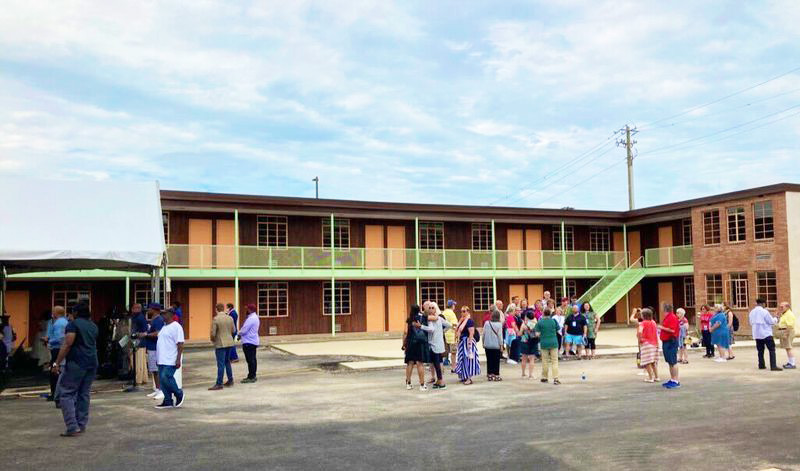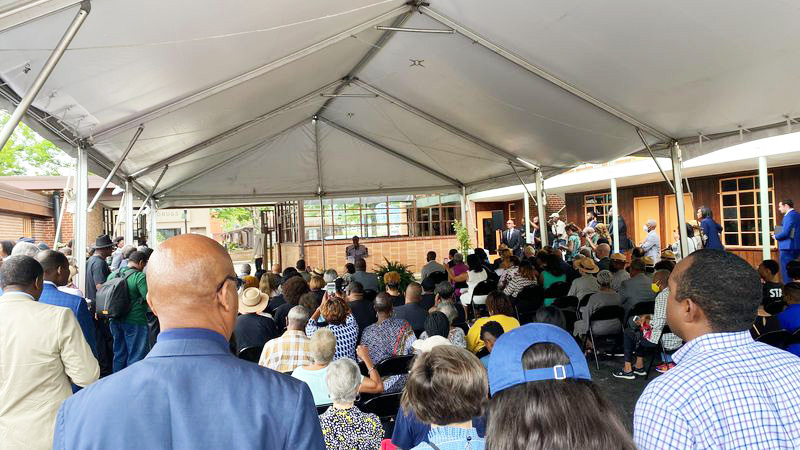
Visitors to Birmingham’s civil rights trail can add one more stop after Thursday’s opening of a new section of the historic A.G. Gaston Motel.
Named after Birmingham’s first Black millionaire, Arthur George Gaston, the motel, which has been closed for decades, served as a headquarters for leaders during the civil rights movement.
Officials hope a renovation of the motel (although no longer in operation) will galvanize a new generation of leaders and citizens committed to following in the footsteps of Gaston.
“I see a future where Black-owned businesses thrive in this neighborhood… where a new generation of Black architects and contractors expand on the artistic legacies of Black architects like Robert Taylor,” said Brent Leggs, the executive director of the African American Cultural Heritage Action Fund.
The motel was first opened 68 years ago. Bombs exploded near the room where Dr. Martin Luther King Jr. was staying in 1963. The motel now will serve as a museum and historic site. The 1968 wing with the restored coffee shop and dining room so far have been renovated, and visitors can stop by a room that explains Gaston’s legacy and work after seeing other sites on the Civil Rights Trail.
Mayor Randall Woodfin gave a speech recognizing the accomplishments made since the project’s initiation in 2019. He said, “This motel symbolizes Black enterprise in our city, Black solidarity, Black willpower and organization, Black victory in the face of social injustice that stood, unfortunately… The motel represents the soul of the city no matter race, gender, creed, sexuality or nationality.”
“I will say to you right now that some would rather ignore our past than come to terms with it,” said U.S. Secretary of Transportation Pete Buttigieg, who was in Alabama to discuss several infrastructure projects, “but of course, the promise of our future depends on our relationship with the past.”
The motel operated as a headquarters for prominent civil rights activists (including Rev. Fred Shuttlesworth, Ralph Abernathy, James Baldwin and Aretha Franklin) as well as an open space for other social events.
“I hope that folks take from this that you can create your dream and vision and have it live on past you and you, too, can leave a legacy,” Josh Coleman, the deputy director of the Division of Social Justice of the mayor’s office said.
At the center of Birmingham’s Civil Rights District, officials hope the motel will gain the same attraction as surrounding historic sites: the Birmingham Civil Rights Institute, Bethel Baptist Church, the Sixteenth Street Baptist Church and Linn Park.
“As a resident of the Birmingham Civil Rights Institute, we are so excited to not only share sacred space with the A.G. Gaston Motel, but also for the opportunity to continue lifting the voices and the stories of our community,” said Civil Rights Institute President and CEO DeJuana Thompson. “This is a wonderful time for our city, for our Civil Rights family, and we look forward to partnering however we can.”
A Mellon Foundation grant of $1.1 million went into the creation of A.G. Gaston’s exhibit within the motel as well as artifacts of Gaston’s life given directly by his extended family members. An additional $5.6 million has been dedicated to Phase 3 of the project, the final stage of renovations. These funds will be used to restore other parts of the motel’s interior design.
A previous version of this story incorrectly stated Gaston’s net worth. He was a millionaire.











